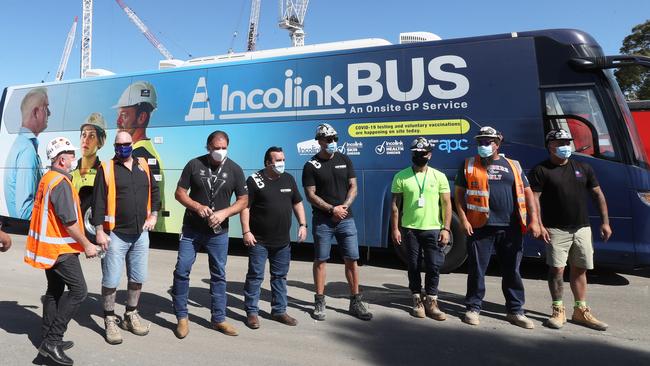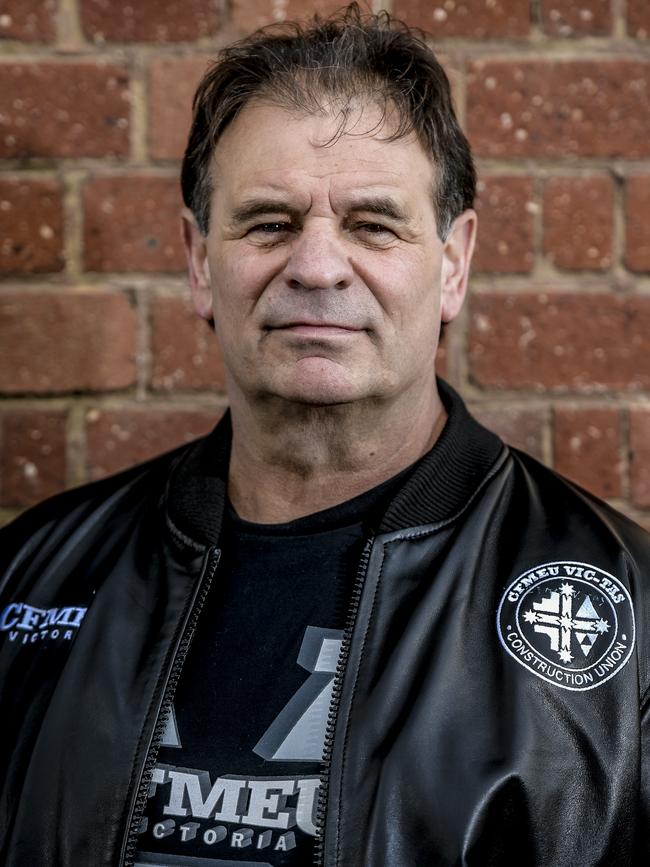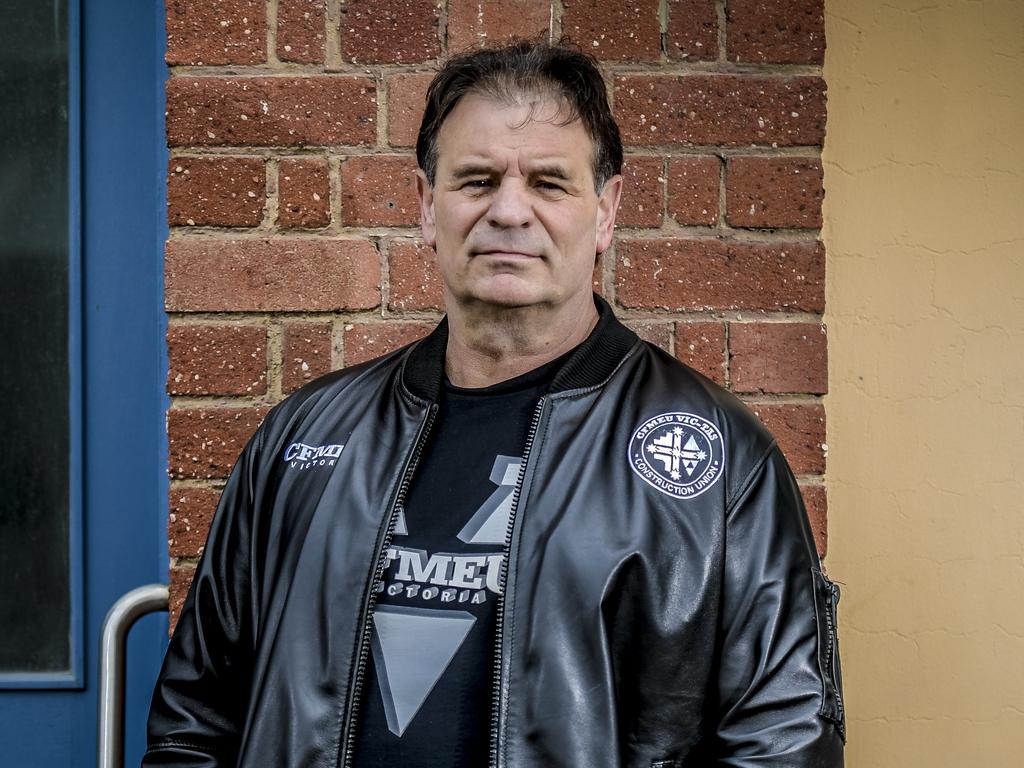Building up towards a fight over workers’ entitlements in construction industry
A schism is emerging within the Australian construction industry as Victoria’s CFMEU-backed worker entitlement giant moves to turn itself into a national entity.

A schism is emerging within the Australian construction industry as Victoria’s CFMEU-backed worker entitlement giant, Incolink, moves to turn itself into a national entity by steamrolling workers schemes in other states.
South Australia has become the test site for what builders outside Victoria fear will be a national expansion by Incolink, Australia’s biggest worker entitlement scheme, which holds $885m in funds under management.
There are two issues at play – the fear of building employers and subcontractors being forced to pay increased weekly contributions to Incolink at higher Victorian rates under future enterprise agreements; and the key question of governance, with Incolink channelling millions of dollars in funds back to the John Setka-led Victorian CFMEU and the Victorian arm of the Master Builders Association, MBAV.
Incolink gave $20.5m in the past financial year to the CFMEU and MBAV for “industry-based training” and has made other payments to both organisations, with critics describing the disbursement of money as opaque.
It is the role of MBAV and the silence of the Master Builders Association’s national body on the question that is now causing tension among builders around the country. MBAV has refused requests from The Australian for comment about its support for Incolink and whether it believes it is fair for builders in other states to pay funds into Incolink rather than their own existing state schemes.
Builders in SA have labelled MBAV “sellouts” over its support for Incolink’s expansion and its perceived closeness to the militant Victorian arm of the CFMEU.
SA’s 80,000-strong building industry has been served since 1989 by its own scheme, the Building Industry Redundancy Scheme Trust, or BIRST, which holds $43m in workers funds.
The issue has come to a head in SA since Setka assumed complete local control as state CFMEU secretary last year after a protracted campaign to sideline the SA branch’s once-moderate leadership. Since his elevation, Setka has made it clear he believes workers in SA should be covered by Incolink rather than BIRST, telling The Australian last month the two schemes were like a “Bentley compared to a rusted-out EH Holden”.
The same argument has been made by Incolink chief executive and former Victorian Labor secretary Erik Locke, who says BIRST is “a substandard scheme”, pointing to Incolink’s record running vaccinations for building workers during the pandemic and the training, mental health and safety programs it provides.
While not commenting on claims of a national takeover, Locke says Incolink already has members outside Victoria and the scheme is simply attracting members due to its superiority. “Incolink offers our premium services wherever we have members, in Tasmania, Victoria, NSW and SA,” he says.
“We have employer members and worker members, and will always act in their interests. Our members get the security of redundancy payments, portable sick leave, income protection insurance and industry-best training, health and wellbeing supports like a 24/7 counselling line and onsite suicide prevention programs to build a stronger industry.
“We’re the best safety net in the industry, and that is why people want Incolink.”
But builders outside Victoria regard the organisation with suspicion, seeing it as a cash cow for the CFMEU and MBAV, and asking how and why its wholly Victorian board should have any say over money from the building industry beyond Victoria. The Incolink board includes Setka and CFMEU president Robert Graauwmans, Plumbing Trades Employees Union secretary Earl Setches, Master Plumbers chief executive Peter Daly and MBAV chief executive Michaela Lihou. The Incolink president is the immediate past MBAV chief executive, Rebecca Casson.
With the exception of vocal Adelaide property developer Theo Maras, none of the many SA builders who have spoken to The Australian have been prepared to go on the record for fear of raising the ire of the CFMEU.
One subcontractor has written anonymously to The Australian describing what was happening as “a major Victorian power play which has got businesses like mine caught in the middle”.
“You need to keep exposing what is happening on South Australian construction sites,” the letter reads. “I am a subcontractor who works on Tier 1 building sites. We’ve been around for years and are South Australian through and through. I resent the fact that we are being effectively stood over by a bunch of Victorians and told how to operate in our own backyard.
“Tier 1 builders here are now being told by the CFMEU that unless their subcontractors sign a union deal they won’t be allowed to work on site. The Victorian industry is a basket case with a s..tload of businesses going under lately, so we don’t want their crap here. The amount of money that will leave SA for the Victorian CFMEU and MBA could be millions and millions of dollars every year. As a proud South Australian this sickens me.”
The tensions within the MBA have been exacerbated by the fact that while other state MBA divisions must rely on driving membership to generate revenue, MBAV can rely on returns through Incolink. Victorian MBA membership has been in free fall, down from 8389 in 2018 to 6538 last year, none of which overly hurts the MBAV because of its access to Incolink funds.
Incolink has gained a foothold in Tasmania and The Australian has spoken to building industry figures in NSW, the Northern Territory and Western Australia who fear Incolink wants to muscle out their existing state redundancy and entitlement schemes.

The biggest prize would be the NSW scheme, the Australian Construction Industry Redundancy Trust, or ACIRT, which holds about $780m in funds, and with a new NSW enterprise agreement to be struck later this year the NSW building industry worries the CFMEU will insist on Incolink being the “agreed fund” between employers and workers.
One senior NSW building industry figure says he has no doubt Incolink would love to get its hands on ACIRT.
“The real issue here is the morality of builders being enlisted nationally to prop up a Victorian-run outfit which shares money between an organisation in the MBAV that’s in bed with the CFMEU, and gives the other half of the money to the very union that’s spent years making life hell for us,” the industry figure says. “The real fear is that when new EBAs are being negotiated outside of Victoria, builders won’t resist because they are worried about the union and also because they have nowhere to complain to any more because the government got rid of the ABCC (the Australian Building and Construction Commission).”
SA Premier Peter Malinauskas told The Australian last month he shared SA builders’ concerns about Incolink. “Why would we want to see money move out of South Australia and into Victoria unless it somehow is contributing to a better outcome for workers?” he asked. However, The Australian understands the SA government probably is unable to do anything to prevent the move as it has no constitutional power over industrial law – and there is no expectation the Albanese government will get involved.
SA opposition Treasury spokesman Matt Cowdrey accuses the Malinauskas government of “talking a big game” but failing to explore every option. “There has been no action, no acts, no powers, no functions or, frankly, any leadership deployed by the Premier to date,” Cowdrey says. “If the Premier wants to flex a bit of muscle and authority, there are options. A bill can be introduced to this place to provide a safe haven, a government-protected fund. While we may be unable, due to the nature of the industrial relations heads of power, to compel businesses to use a particular fund, we can strongly recommend that they do and we can provide an alternative.”
The 2015 final report of the Royal Commission into Trade Union Governance and Corruption called for legislation to clamp down on worker entitlement funds. Royal commissioner Dyson Heydon said entitlement funds, unlike industry superannuation, operated with no requirement for annual reports, accounts to interested parties or disclosures of fees, commissions and charges.
The Australian revealed earlier this year that Australian Electoral Commission data showed union-linked entitlement funds have paid an average of $32m a year to unions between 2011-12 and 2021-22 – with $189m going to the CFMEU during that period. The Australian asked the national office of the MBA whether it supported Incolink’s moves beyond Victoria but was told it had no comment.








To join the conversation, please log in. Don't have an account? Register
Join the conversation, you are commenting as Logout